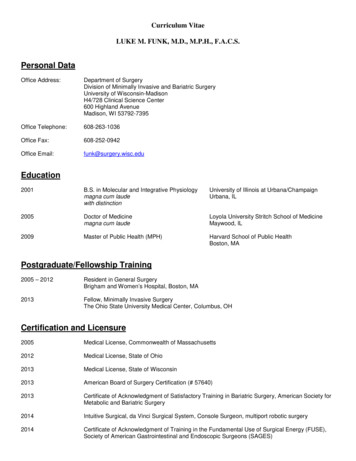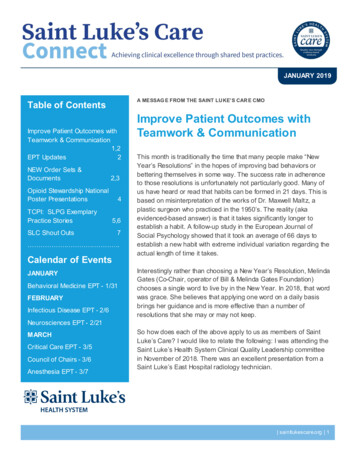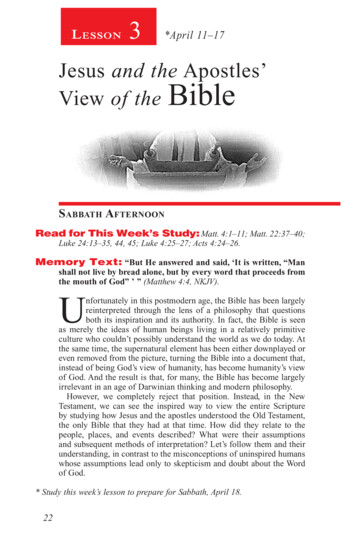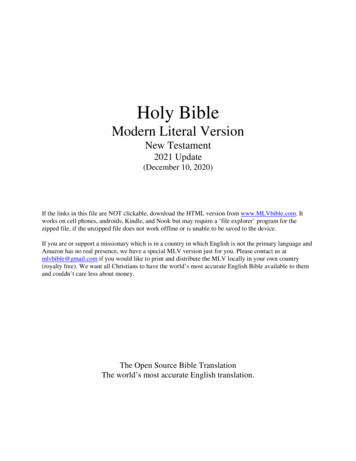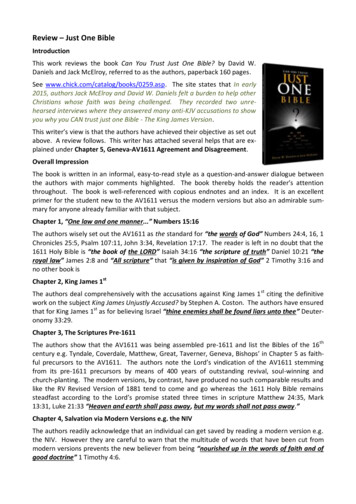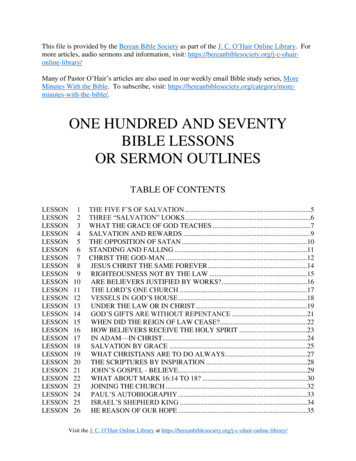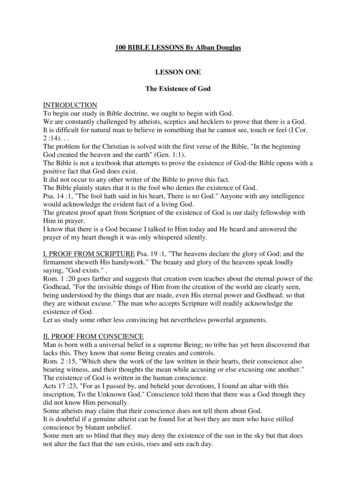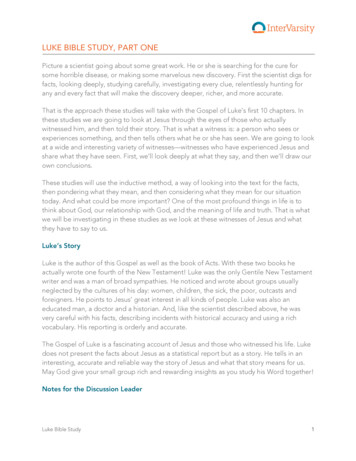
Transcription
LUKE BIBLE STUDY, PART ONEPicture a scientist going about some great work. He or she is searching for the cure forsome horrible disease, or making some marvelous new discovery. First the scientist digs forfacts, looking deeply, studying carefully, investigating every clue, relentlessly hunting forany and every fact that will make the discovery deeper, richer, and more accurate.That is the approach these studies will take with the Gospel of Luke’s first 10 chapters. Inthese studies we are going to look at Jesus through the eyes of those who actuallywitnessed him, and then told their story. That is what a witness is: a person who sees orexperiences something, and then tells others what he or she has seen. We are going to lookat a wide and interesting variety of witnesses—witnesses who have experienced Jesus andshare what they have seen. First, we’ll look deeply at what they say, and then we’ll draw ourown conclusions.These studies will use the inductive method, a way of looking into the text for the facts,then pondering what they mean, and then considering what they mean for our situationtoday. And what could be more important? One of the most profound things in life is tothink about God, our relationship with God, and the meaning of life and truth. That is whatwe will be investigating in these studies as we look at these witnesses of Jesus and whatthey have to say to us.Luke’s StoryLuke is the author of this Gospel as well as the book of Acts. With these two books heactually wrote one fourth of the New Testament! Luke was the only Gentile New Testamentwriter and was a man of broad sympathies. He noticed and wrote about groups usuallyneglected by the cultures of his day: women, children, the sick, the poor, outcasts andforeigners. He points to Jesus’ great interest in all kinds of people. Luke was also aneducated man, a doctor and a historian. And, like the scientist described above, he wasvery careful with his facts, describing incidents with historical accuracy and using a richvocabulary. His reporting is orderly and accurate.The Gospel of Luke is a fascinating account of Jesus and those who witnessed his life. Lukedoes not present the facts about Jesus as a statistical report but as a story. He tells in aninteresting, accurate and reliable way the story of Jesus and what that story means for us.May God give your small group rich and rewarding insights as you study his Word together!Notes for the Discussion LeaderLuke Bible Study1
You can help your group get the most out of these studies by presenting some guidelinesfor effective discussion just before you get into the passage. Here are some you canmention: Approach the Bible as you would any good primary source: be open to learn.Let the text speak for itself rather than depending on something you’ve heard orread about it.Expect the text, rather than the leader, to answer questions that come up.Stay in the passage. On occasion, when background information is necessary, thestudy guide may refer the group to another passage. But that is the only time to goout of the passage. Don’t go off on tangents into different passages.Stay on the point under discussion.Keep in mind that each person’s part in the discussion helps the group to learnmore. People who talk easily in discussion can make space for quieter people tocontribute also. God can use what each one says to help the rest of us. And we canhonor each other by listening to each other.The second time the group meets, it may be helpful to run lightly over these guidelinesagain.The questions in this guide are for your use in preparing and leading. (Note: Helpfulleader’s notes are in italics throughout the guide.) Put the questions into your own words ifyou’d like, yet try to stay within the intent of each question. Become so familiar with thequestions that you won’t be looking down at your page all the time. Have your own writtenresponses handy as you lead the study. Since the questions are based on the constructionof the passage, they will lead the group to major teachings. Decide how much discussiontime each group of questions is worth. This will help you pace the discussion.Make sure that each study ends with one or two questions of application, even if that meanswatching the clock and leaving out a few of the suggested questions. Begin and end thestudy on time.Note: It is easier for study and discussion if everyone has the same version of the Bible. TheNew International Version (NIV), the New American Standard Bible (NASB), or the NewRevised Standard Version (NRSV) are good and popular versions of the Bible, and any oneof them would be accurate and reliable to use together. The questions in these studies arebased on the NRSV text.Throughout the series of discussions, pray for the members of your group—that they’ll beprepared and open for the study-discussion, and that God would speak powerfully to themas they dig into his Word together.Luke Bible Study2
LUKE 1:1-4: LUKE, THE INVESTIGATIVE WITNESSGetting StartedBefore we dig into the Gospel of Luke, it’s important to reflect on our own stories in relationto Jesus. All of us, no matter what our backgrounds and experiences, have a story about ourknowledge of and relationship with Jesus. Even those of us from non-religious or nonChristian backgrounds have some thoughts and opinions about Jesus. They may be warm,indifferent, or angry opinions. That’s okay. We want to establish an accepting, openatmosphere where we listen to each other and grow together.Take some time now to share your own stories or thoughts about Jesus and yourrelationship with him at this point in your life. (Note: You can give significant time to thissharing, as the rest of this first study is relatively short.)1. Turn to Luke’s own introduction to his Gospel, Luke 1:1-4. Have someone read thepassage as everyone follows along. From these four verses, what do you learn about theGospel of Luke? What do they tell us about its historical accuracy?2. Trace through these verses how the “events that were fulfilled among us” came to bewritten down into “orderly accounts.” What process did the writers go through?3. Who do you think some of these “eyewitnesses” might be? What does Luke say aboutthe others who have written accounts?4. In verse 3 Luke tells us he wrote to Theophilus. What can we learn about Theophilus fromthe text? Why did Luke write to him?5. How do you think Luke’s emphasis on talking to eyewitnesses and writing an orderlyaccount will help you as you study his Gospel in the coming weeks?6. Suppose Luke just came in the door of your room and told you excitedly about hisinvestigation. He’s been talking to eyewitnesses about Jesus and putting together anorderly account. What would you like him to investigate, to find out about Jesus? Whatshould he find out from the eyewitnesses? Share some of the questions you come up with,and keep them in mind in the coming weeks to see if Luke gives you any answers.In ClosingWhat is it that you would most like to learn or experience about Jesus in the coming weeks?(You may want to spend some time in prayer as a group asking Jesus to reveal himself toyou in deep and powerful ways.)Luke Bible Study3
LUKE 1:26-38: GABRIEL, THE HEAVENLY WITNESSGetting StartedThink of something great. What does “great” mean to you? Share your ideas.In this passage, a heavenly visitor comes to Mary and proclaims that she will miraculouslybear a child, and that he will be great. Let’s see what greatness is for Jesus as we delve intothis famous passage.1. Have someone read this text aloud with the rest following along. Verse 26 gives us a“when,” a time indicator. Look back to verses 5-24 to find out what happened six monthsearlier.2. What do we learn about Joseph in verse 27? Why do you think this might be significant?How is Mary described?3. How does the angel encourage Mary in verses 28-31? Have you ever experienced God’sgrace or favor in an unusual way? Talk about it. How did it feel? How did you respond?4. In verse 32 Gabriel says that Jesus will be “great.” Then he describes four things thatJesus will be or have or do. What are they? What do these four things have in common?(They all have to do with kingship or kingdoms: “Son of the Most High,” “give him thethrone of . . . David,” “reign over the house of Jacob,” “of this kingdom there will be noend.”)5. Our concept of kingship these days is pretty shallow, mostly centering around the foiblesof the British royal family or a certain king buried in Graceland. What power did kings havein the ancient world? What would it mean to have a king whose kingdom would never end?6. What does it mean for us today that Jesus is a king, an eternal king, whose kingdom willnever end? Where do you think his kingdom is today? How might this change or enlargeyour concept of Jesus? How does it honestly make you feel about him?7. What progression do you see in Mary’s responses in verses 29, 34, and 38? How doesGabriel answer her question about how this could happen (verses 35-37)? Have you everexperienced going from confusion to questioning to faith? What was the situation?8. What do you think the angel’s statement in verse 37 meant for Mary? What could it meanfor you today?In ClosingLuke Bible Study4
In this story, Gabriel gives an announcement, a word from God, and describes Jesus as thegreat King. Mary responds, after some perplexity and questioning, with faith in this word.What does it mean for you to live by faith in the Word? What would this faith look like?What practical small step of faith could you take this week, based on God’s Word?Luke Bible Study5
LUKE 2:1-20: ANGELS AND SHEPHERDS: JOYFUL WITNESSESGetting StartedWhen have you experienced good news? Think of a time you received good news andshare a little about it. In this passage we will read about some good news brought byheavenly messengers to some unlikely witnesses. We’ll ponder what it means that Jesus is“good news.”1. Have three people read the passage, with each one reading a paragraph (the paragraphsare verses 1-7, 8-14, and 15-20). (Note: For some in the group, even the first few words [“Inthose days a decree went out . . .”] may bring back memories of trees, lights, presents, or amidnight Mass or service with the family. But a key to inductive Bible study is to approachthe text in a fresh way as if one had never seen it before. This may be hard, but urge thegroup to try.)2. In the first few verses, what are some clues that the historian Luke is trying to be painfullyaccurate with his political and historical facts? Why do you think he mentions Romanemperors and governors—people of power?3. In verses 4-7, what new things do we learn about Joseph and Mary? What facts aboutthem are repeated from our study in Luke 1:26-38? Put yourself in the drama. How wouldyou feel, trudging over 100 miles because some occupation government officials wantedyou to register so they could tax you and, if you are a man, possibly draft you into theirarmy? Look again at verse 7. What different emotions might Joseph and Mary haveexperienced?4. Shepherds were poor, lower-class people in their society, despised by religious Jewsbecause their work kept them away from many religious activities. Looking at verses 8-14,why do you think God chose shepherds to be the first ones to hear the good news of thebirth of Jesus?5. In verse 10, the angel talks about “good news of great joy for all people.” Look carefullyat the three ways Jesus is described in verse 11. What are they? (Savior, Messiah [or Christ],Lord.) What would each of these have meant for poor Jewish shepherds under Romanoccupation in the first century? Take time to ponder what each description means to ustoday. Why is this announcement by the angel good news?6. Notice the contrast between these majestic titles for Jesus and the poor situation intowhich he was born in verses 6-7. Why do you think Luke emphasizes this contrast?Luke Bible Study6
7. What is the reaction in heaven to the birth of Jesus according to verses 13-14? What is abenefit to those on earth? “On earth peace among those whom he favors” is a differenttranslation from the one in our traditional Christmas carols, but it is more accurate. What doyou think it means?8. After the angels leave, in verses 15-16, what do the shepherds do? What have theybecome? (Witnesses! Someone who sees and then tells.)9. What is the shepherds’ first act after seeing and experiencing Jesus (verse 17)? Thinkback to the time when you experienced good news in your life. Did you want to tell othersabout the good thing? If we truly experience Jesus in our lives, and thus become“witnesses” to his truth as the shepherds were, how might we respond?In ClosingAgain, put yourself into the passage. What feelings do you think Mary experienced in thispassage? What feelings did the shepherds experience? Note that the shepherds leftglorifying and praising God (verse 20). Is there anything in your life or experience right nowfor which you can praise God? Is there anything you are thankful for? (Note: You may wantto end the study by sharing some things each person is thankful for, and then spendingtime in prayer praising and thanking God.)Luke Bible Study7
LUKE 2:22-40: SIMEON AND ANNA: PATIENT, FAITHFUL WITNESSESGetting StartedWhat do you want to be like at the end of your life? What do you want to haveaccomplished? You may not have done a lot of thinking about this, but take a few momentsto share some preliminary thoughts.In this study we are going to look at two older people whose lives ended well. They seemedto know how to live life with power and meaning. Let’s look at their “witness” to Jesus.1. Have someone (or a few people) read Luke 2:22-40 aloud. Verses 22-35 are aboutSimeon, and verses 36-40 about Anna.2. Verses 1-21 of this chapter describe the birth and circumcision of Jesus. Now it is time forhis “presentation.” How is this ceremony described in verses 22-24? Leviticus 12:6-8 in theOld Tes
Luke Bible Study 1 LUKE BIBLE STUDY, PART ONE Picture a scientist going about some great work. He or she is searching for the cure for some horrible disease, or making some marvelous new discovery. First the scientist digs for facts, looking deeply, studying carefully, investigating every clue, relentlessly hunting for any and every fact that will make the discovery deeper, richer, and more .
